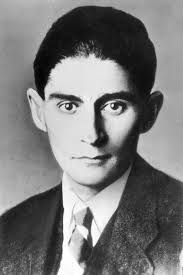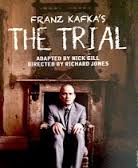As you may know (and in some circles it’s been hard to miss) 2015 is the 100th anniversary of the publication of ‘Metamorphosis’. It’s also the 100th anniversary of the writing of ‘The Trial’, which is great because in 2025 we’ll be able to have another Kafka celebration year commemorating the delayed publication of this modern classic. This year, everyone’s been outdoing each other in remembering why they love existential angst. The BBC went Kafka crazy back in May and I finally caught up with them this week when I listened to Margaret Atwood’s excellent essay, ‘In the Shadow of Kafka‘, which is still available on iplayer Radio.
The reason I’m thinking about Kafka now (rather than in May) was that I recently went to see a play of ‘The Trial’, written by Nick Gill, at the Young Vic theatre in London. ‘The Trial’ is Kafka’s most famous (and most complete) novel; if you’re not familiar with it, the story is basically summarised in its fantastic opening sentence: ‘Someone must have been telling lies about Josef K., he knew he had done nothing wrong but, one morning, he was arrested.’
Staring the wonderful Rory Kinnear, the play did interesting things with setting, staging and interior monologues, but ultimately it was one of those occasions when an adaptation mainly succeeds in reminding you of how much you loved the original text. This means that, after a long preamble, I’m going to get to the main point of this post which is to set out, subjectively, why I love ‘The Trial’ and why I may never find a dramatisation that really manages to distill the evocative and elusive magic of the novel.
1. The mixture of the vague and the precise. The thing about ‘The Trial’ is that the story is so simple and K is such an ‘everyman’ that his arrest can feel real and yet can mean different things to nearly every reader. I ran a book club a few years ago in which we read ‘The Trial’ and the discussion showed that the story spoke personally to readers from from all over the world (South Africa, UK, America, Israel…) and from a huge age range. One woman had encountered it after visiting Soviet Russia, another man discovered it after leaving apartheid South Africa; the message of ‘The Trial’ was powerful, resonant and completely different for the two readers.
2. The existentialism. This is far too big a topic to go into in detail here (and I’m certainly not expert enough to try) but I am going to attempt a partial explanation of one idea in the novel that I find utterly intriguing. In ‘The Trial’ K is arrested and so he is faced with two choices – deny the charge and the whole system behind it, or work within the system to assert his innocence. At first K considers laughing at the situation, because it must be a joke, but he soon decides ‘if they were play-acting he would act along with them.’ The problem is that as soon as he starts to ‘act along’ he becomes sucked into the system. The more aware K is of the world of the court, the more of a victim he becomes; going along to hearings forces him into the position of a supplicant, trying to understand the nature of his charge leads to an obsession with making sense of his circumstances. This is a futile, philosophical interpretation however because even though K always has an intellectual or emotional choice in how he responds to his trial, he does not live in a vacuum. Even protesting his innocence means acknowledging that others think he’s guilty and, as K finds, there is something compelling and insidiously attractive about falling in with others’ conception of you. I think that K acts more and more guilty as the novel progresses, not because he has done anything wrong, but because each time he assumes his tormentors are correct they treat him that little bit worse. It becomes a vicious downwards spiral because K’s sense of self is constantly realigned to fit in with the way he is perceived. The end of the book is an existential triumph as K finally fully accepts the identity that has been thrust upon him. The more I read and re-read the novel the more I wonder how much of a choice he ever really had.
It is ironic that Kafka, that most lucid of prose-writers, manages to make everyone else nearly incoherent when they try to unpick his work. Still, I’ve got a few more months to come up with some good existential insights and I’m certainly going to enjoy the rest of this centenary year.






Hi, so enjoyed reading this review. This book is nowhere on any of my Wish Lists, but after reading this and also Zadie Smith’s “Changing My Mind” essay on him I am beginning to realise perhaps I should take the plunge?? The prospect feels like such a daunting one, although how wonderful that you saw the play recently at the Young Vic. With Rory Kinnear to boot…
By the by, have just finished working on a list of NY books, almost reading for posting and hope you will check it over and spot some omissions. Nicola
I would really recommend it! It’s not very long but, if you want to check, how about trying ‘Metamorphosis’ first which is a genuine short story, not an incomplete novella which happens to have a final chapter.
Can’t wait to see your NY books – I think my most recent addition would have to be ‘Call It Sleep’ by Henry Roth which I read ages ago but can’t remember and so think is due a second try.
Perfect, thank you.
Adding the Roth right now, do you mind if I mention you on the post?
Please do!
I really enjoyed your post, too! It’s been so long since I read any Kafka. I read a few of his works when I was in my twenties but very little since then. Perhaps I’ll reread something later this year. 🙂
That’s what’s been so great about the centenary; I hadn’t really been thinking about re-reading Kafka, but the play and the BBC have reminded me how much I love him. Let me know if the stories seem different as you re-read them from a new perspective.
Excellent post, and thanks for the BBC links which I’d somehow managed to miss!
Now I’m just waiting for them to repeat their dramatisations of ‘The Trial’ and ‘Metamorphosis’ (read by Benedict Cumberbatch!)
I have just started this book, it’s on the 100 Greatest Novels list and I have loved Kafka’s other work. Something I really love and alternatively feel guilty about, that you may already know, is that he didn’t want us to read his work, he burned most of his work when alive, and when dying, asked his friend to burn the rest. Whilst we’re all grateful he didn’t, and I hope if Kafka knew his work would be appreciated he’d have changed his mind, it’s unusual to read work that was written for the writer alone.
I wish the BBC would let us download these things, I want to pay to have my own Cumberbatch ‘Metamorphosis’ to keep forever, I hate waiting for repeats!
The publication history is difficult. I think I’ve made my peace with it because Kafka did read his work to his friends so, at some point, he definitely intended for it to be known, even though he later changed his mind. Like you, I think there can be real issues around privacy and publications, but I agree, it’s very hard to apply this rule to Kafka because his writing really is so good.
Pingback: How to buy a drink in Prohibition American: ‘Babbit’ by Sinclair Lewis (1922) | Shoshi's Book Blog